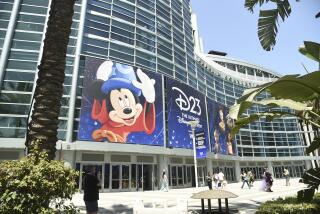Amusement Sites Reopen
Walt Disney Co., Universal Studios and other major theme park operators reopened for business Wednesday amid questions about the impact of the terrorist attacks on the already-sluggish theme park industry.
The full financial toll on the theme parks is likely to exceed revenue lost from the shutdowns, which are exceedingly rare, analysts say.
At least in the short term, travel worries, high gasoline prices and fear of more attacks could squeeze the nation’s top theme parks. The parks already were hurting from an economic slowdown that could grow worse with Tuesday’s calamity. Universal, a subsidiary of Vivendi Universal, Disney and others closed their parks in California and Florida on Tuesday over security concerns.
“It’s been a slow year and I’m sure this is not going to help things,” said Bill Coan, an industry consultant in Orlando, Fla.
Some visitors may avoid visiting major theme parks because of a perception, reinforced by the shutdowns, that the sites could be terrorist targets, Coan said.
Depending on how the U.S. responds to the attack, the consequences could match those of the Persian Gulf War in 1991, which contributed to a significant drop in business at Walt Disney World, Coan said.
The attacks probably will spark more anxiety about air travel, said Randy Pausch, co-director of the entertainment technology center at Carnegie Mellon University in Pittsburgh.
“I predict that in the short term there’s going to be a big hit, because a lot of people who have the discretion to travel are going to be leery about going on a plane,” Pausch said.
Michael Jenkins, president of Leisure and Recreation Concepts of Dallas, said Disney and Universal could see double-digit declines in theme park attendance in the quarter ending Dec. 30, but said the losses won’t be sustained.
“I think this is a downward spike in their attendance but it will be short-term,” Jenkins said.
Leslie Goodman, spokeswoman for Disney parks and resorts, said it’s too early to measure financial repercussions.
“People are still in a state of shock and mourning,” she said. “Our immediate focus is for the safety and assistance of our cast members and guests.”
Universal reopened its Florida and California theme parks Wednesday, with attendance running “basically what we expected” for this time of year, said spokesman Jim Yeager.
He said the Universal parks have beefed up security and are operating as usual with one exception: management at the California park has temporarily closed the portion that shows an animatronic King Kong laying waste to New York.
Susie Storey, spokeswoman for the International Assn. of Amusement Parks and Attractions, agreed that it’s too early to gauge the long-term economic consequences. Most U.S. theme parks--including Knott’s Berry Farm and Six Flags Magic Mountain--reopened Wednesday and are reviewing crisis planning and security.
“It’s just a brutal reminder that safety has got to be something to be considered,” Storey said. “The sad reality is a lot of people are there at once and theme parks have almost become symbols of American entertainment and fun and freedom.”
In addition to a possible slowdown in visitors, Disney and others also will have to absorb losses from the one-day park closings.
Disneyland and California Adventure may have lost a combined $2 million in revenue, estimated John Robinett, senior vice president of Los Angeles-based Economics Research Associates.
Disney and Universal officials would not say how much they would be able to recoup through insurance policies. The economic impact on Orlando from early closings at the city’s Disney, Universal and SeaWorld parks was about $20 million, said Henry Fishkind, an economist there who studies tourism and development.
He said Orlando may suffer long-term effects if consumer confidence falls and airline travel is restricted because of new security measures. “Those things could have a chilling effect on Florida’s tourism market.”
Times staff writer Marla Dickerson and Robert Johnson of the Orlando Sentinel, a Tribune company, contributed to this report.
More to Read
Inside the business of entertainment
The Wide Shot brings you news, analysis and insights on everything from streaming wars to production — and what it all means for the future.
You may occasionally receive promotional content from the Los Angeles Times.











